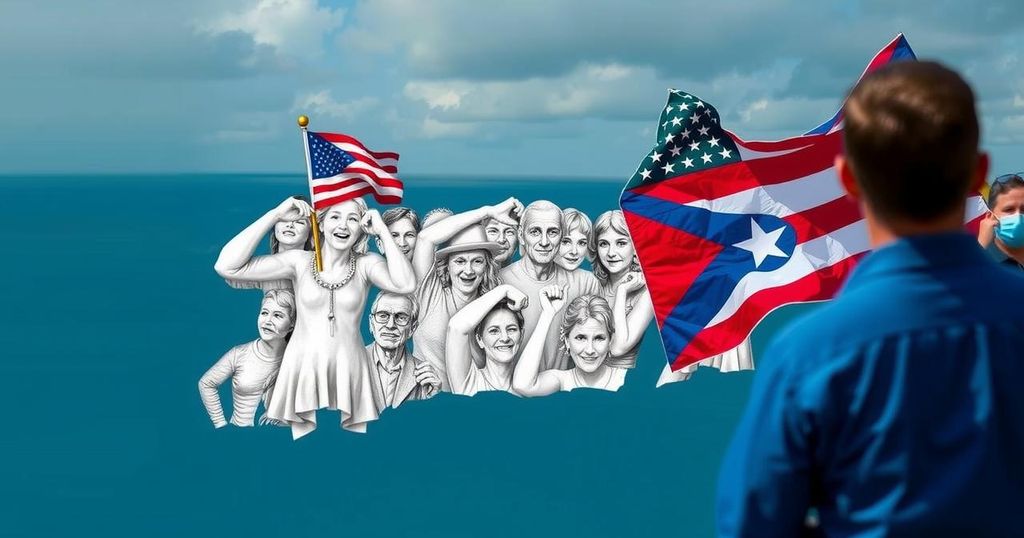Puerto Rico is preparing for elections where a historic third-party candidate, Juan Dalmau, could disrupt the traditional political landscape dominated by two parties. Polls show him closely trailing Jenniffer González of the New Progressive Party amid widespread dissatisfaction with corruption and public service failures. This reflects a generational shift in the electorate’s priorities, with heightened voter engagement expected. The elections will also include a referendum on the island’s political status, making the stakes of this election particularly significant for Puerto Rico’s future.
As Puerto Rico braces for Election Day, the political landscape is witnessing a historic shift with the emergence of a formidable third-party candidate, Juan Dalmau, representing the Puerto Rico Independence Party and the Citizen Victory Movement. Dalmau is polling closely behind Jenniffer González, a prominent member of the New Progressive Party and current representative in Congress. Recent polls indicate a tight race, with Dalmau garnering 29% support compared to González’s 31%, a significant leap from earlier polling data that showed him trailing. This election marks a pivotal moment as younger voters express their discontent with the traditional political parties, which have dominated the scene for decades but are now seen as ineffective amid ongoing corruption, power outages, and fiscal mismanagement. Historically, Puerto Rican politics have been characterized by a bipolar system, primarily divided between the pro-statehood New Progressive Party and the Popular Democratic Party, which supports the current territorial status. However, the financial crisis catalyzed by a substantial public debt has led to growing frustration among the electorate, culminating in the acceptance of third-party alternatives. Dalmau’s campaign promises to terminate contracts with energy companies associated with persistent power outages resonate within a population clamoring for change. Voter turnout remains a concern, yet the surge in new voter registrations indicates a potentially significant engagement ahead of the elections. Political analysts highlight a generational divide, suggesting that younger voters overwhelmingly favor Dalmau, while older constituents lean toward González. This demographic shift could be crucial in determining the outcome of the gubernatorial race. Furthermore, the elections will simultaneously include a seventh referendum on Puerto Rico’s political status, presenting voters with options for statehood, independence, or independence with free association. Regardless of the referendum’s outcome, it remains a heavily scrutinized issue, often resulting in an apparent lack of action from Congress. Amidst these developments, public sentiment has been ignited further by cultural figures such as reggaetón artist Bad Bunny, whose critiques of the established political parties have resonated with the youth. The environment is tense as both candidates face pressures to address pressing issues such as housing, healthcare, and crime while combatting a legacy of apathy among voters. The outcome of this election could set a new course for Puerto Rican politics, ushering in an era of third-party influence and renewed engagement from the electorate.
The political scene in Puerto Rico has traditionally been dominated by two parties: the New Progressive Party (NPP) and the Popular Democratic Party (PDP). These parties have held sway over local politics for decades, often splitting over 90% of votes in general elections. In recent years, however, the financial crises and corruption scandals have eroded their popularity, particularly following the establishment of a federal oversight board in 2016 due to the government’s inability to manage a massive $70 billion public debt. This backdrop has fostered a fertile ground for third-party movements such as the Puerto Rico Independence Party and the Citizen Victory Movement. Candidate Juan Dalmau’s rise in the polls indicates both dissatisfaction with existing political structures and a yearning for change among the electorate, particularly the younger demographic disillusioned by power outages and financial mismanagement.
In conclusion, Puerto Rico’s upcoming elections signify a critical juncture in the territory’s political trajectory, with a third-party candidate positioning himself as a legitimate contender against established party leaders. As voters express their frustrations over the ongoing issues affecting their daily lives, the outcome could potentially redefine the political landscape and challenge the long-held dominance of the historical parties. The concurrent referendum on political status further complicates the electoral climate, underscoring the significance of these elections for the future of Puerto Rico’s governance and relationship with the United States.
Original Source: apnews.com






